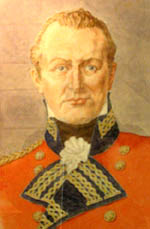
A bust of Sir Isaac Brock

Sir Isaac Brock
Sir Isaac Brock was born on October 6, 1769 in Guernsey. He was a professional soldier and first arrived in Canada in 1802 with his company the 49th Foot. He worked very hard to make life for the regular soldier better, as this would cut down on the problem the army had with people deserting. He also worked on improving the defenses of Canada, as he knew the Americans were thinking about war.
In July of 1810, Brock was sent to Upper Canada. By this time, he was a brigadier general, and was put in charge of the military in that province. He was promoted to major general in 1811, and also was acting as administrator of the province (the Lieutenant Governor was on leave in England). When war was declared in 1812, Brock was ready to act.
Once Brock heard of Hull's invasion of Canada, he took about 300 men and rushed to the defense of the Western District. He met
Tecumseh at Fort
Malden, and together they came up with the plan that captured Detroit from the Americans on August 16.
After the capture of Detroit, Brock returned to the Niagara region, where he expected the Americans to attack next. He died on Oct. 13, 1812 leading his men at the Battle of Queenston Heights. His death was a great blow to both the British and their Native allies.

A bust of Sir Isaac Brock |

Sir Isaac Brock |
Richardson's
Description of Brock
(from Richardson's War of 1812, p. 116)
As no portrait, public or private, of General Brock, seems to have been preserved in the country, it may not be unimportant here to give a slight written sketch of the hero. In person he was tall, stout and inclining to corpulence: he was of fair and florid complexion, had a large forehead, full face, but not prominent features, rather small, grayish-blue eyes, with a very slight cast in one of them - small mouth, with a pleasing smile, and good teeth. In manner he was exceedingly affable and gentlemanly, of a cheerful and social habit, partial to dancing, and although never married, extremely devoted to female society. Of the chivalry of his nature, and the soundness of his judgment, evidence enough has been given in the foregoing pages to render all comment thereon a matter of supererogation.